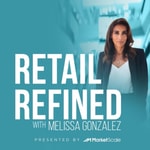Retail Refined – Détails, épisodes et analyse
Détails du podcast
Informations techniques et générales issues du flux RSS du podcast.

Retail Refined
MarketScale
Fréquence : 1 épisode/60j. Total Éps: 90

Classements récents
Dernières positions dans les classements Apple Podcasts et Spotify.
Apple Podcasts
🇨🇦 Canada - marketing
25/09/2024#64
Spotify
Aucun classement récent disponible
Liens partagés entre épisodes et podcasts
Liens présents dans les descriptions d'épisodes et autres podcasts les utilisant également.
See all- https://techcrunch.com/
74 partages
- https://www.target.com/
68 partages
- https://www.instagram.com/melsstyles
2 partages
Qualité et score du flux RSS
Évaluation technique de la qualité et de la structure du flux RSS.
See allScore global : 53%
Historique des publications
Répartition mensuelle des publications d'épisodes au fil des années.
Having Funding Isn't Enough, Entrepreneurs of Color Need an Ecosystem of Resources
Saison 1 · Épisode 85
mercredi 9 février 2022 • Durée 25:30
Making a difference for black-owned businesses is Kendra Bracken-Ferguson. Bracken-Ferguson’s establishment of BrainTrust, an innovative social, digital, and influencer marketing agency focused on growing brands from organic communities since 2016, recently launched BrainTrust Founders Studio. This membership-based community platform creates inclusive economic opportunities for Black Beauty and Wellness Founders, increases business performance, and builds sustainable growth and wealth creation pathways. Bracken-Ferguson joined Retail Refined’s Melissa Gonzalez to share her journey and the BrainTrust Founders Studio initiative.
Bracken-Ferguson, a black founder with a network of other black founders that she mentors and supports vice-versa, knew there needed to be a way to combine all this expertise into an ecosystem of resources, capital, investment to create the next generation of black beauty and wellness founders. And that purpose became the genesis for the BrainTrust Founders Studio.
And why is such a support system essential for young brands when some believe that funding is enough? “Even if someone gets an investment, are they set up operationally,” Bracken-Ferguson said. “Do they have the right team, the resources? Do they have a path to get there? Do they know where their business is going? Are we doing e-commerce, focused on retail, or are we focused on networks? You need all of those pillars to help make sure that not only is your business growing, but it’s sustained growth.”
Bracken-Ferguson recognized the enormous landscape of change in retail in the past couple of years, brought on by the pandemic posed new challenges and opportunities. But that also makes now such a fun time in her eyes. “On one hand, as a consumer, we’re in this place where we want it now. But on top of that, there are so many things we have to think about as marketers and brand builders. We’ve started to map out; where’s every possible place we can be, how do we want to use our products to be in those places, and what is the story we are telling.”
Behind WorkJam's Mission to Improve Retention and Training in Retail
Saison 1 · Épisode 85
mardi 27 septembre 2022 • Durée 26:56
Steve Kramer, CEO at WorkJam, is a twenty-year veteran in e-commerce. His specialty is finding the gaps in how organizations manage their frontlines. He founded WorkJam in 2014 as a digital frontline workplace to solve retail industry issues. “Our platform essentially helps retailers and companies and other industries, such as healthcare, manufacturing, and distribution, to orchestrate their frontline workforces,” Kramer said.
The frontline digital workforce is a new category that reshapes how organizations bi-directionally communicate with their workers. It encompasses all the core elements of managing a frontline under one platform accessible through an employee’s mobile device. No matter how robust a platform is, it’s only a success if it makes a positive difference for employees. “We’ve been able to prove this in working with major organizations around the world,” Kramer said.
With retail worker shortages already rising before the pandemic, the past two and a half years have made the need for engagement and retention a top priority for retailers. “The need to be able to communicate became fundamental,” Kramer said. “And there were no tools available to effectively communicate from the head office down to the field. So, that became a priority for organizations to start addressing.”
The convergence of economic concerns for retailers coinciding with labor shortages is unique for the industry. “It’s pretty much a green field area for organizations where I think it can drive tremendous innovation as well in companies around the world right now,” Kramer said.
In a recent survey of retail and manufacturing executives and how they organized their workforce priorities, Kramer said there were a few main takeaways. Labor shortages & turnover were more significant challenges than supply chain issues, and the great resignation and the movement of employees was another primary concern. “Executives are really focused around solving these issues,” Kramer said. “They want to solve them, particularly through changing labor models and being able to provide flexibility to schedules in the field.”
How Fast Fashion Can Fix Its Sustainability Reputation Through the Supply Chain
Saison 1 · Épisode 75
mardi 1 mars 2022 • Durée 08:44
While at the world’s largest retail conference and expo, Retail Refined Host Melissa Gonzalez spoke with Chris Georgen, Founder and Chief Architect of Topl, a company that sits at the intersection of sustainability, deep-technology, and innovation.
Topl, whose mission is to build trust between consumers and products, is set largely within an industry which has historically lacked that. Georgen remarked on Topl’s unique position within the market, particularly in increasing transparency within the fashion industry using Topl blockchain.
Using the tools created by and within Topl, the ESG impact of a company can vastly improve. Georgen remarked that, “Topl technology can take fashion supply chains from 18 months to 25 days,” which positively impacts these upward-trending ESG-forward values seen in the market as shorter time to delivery means less waste due to demand fluctuations.
Not only this, but Topl blockchain underpins and helps secure data while optimizing performance for different sectors.
As the demand in the market, namely pushed by GenZ’s habit in “voting more with their wallets” because “different things matter,” moves fashion towards different brand differentiators and new brands focus on equity, inclusion, and sustainability, Topl helps to secure trust between the consumer and the brand.
While brand and reputation used to largely underpin market demand, there has been, Georgen remarked, a “reset” caused by the pandemic which means these identifiers are no longer the only consideration in retail spending.
Additionally, Georgen emphasized the role Web3 has in the future of retail and sustainability tokenization. Web3 will be able to “cut off the places to hide” for consumers to see the truth behind company supply chains, resources, and materials and “greenwashing” will become much more difficult.
With ESG-forward values continuing to dominate retail trends, Topl stands at the intersection for providing trust in engagement between brands and consumers.
Bringing One-click Checkouts to Merchants of All Sizes
Saison 1 · Épisode 74
mardi 22 février 2022 • Durée 07:59
Ian Leslie, Senior Director of Retail Advocacy at Bolt, joined Retail Refined for a live chat at NRF 2020. Bolt is a San Francisco-based one-click checkout solution powering checkout across e-commerce merchants across the internet.
“We’re trying to bring one-click checkout to all merchants whether they’re big or small,” Leslie said. “Give them a best-in-class experience, and also allow them to be able to identify their customers and allow their customers to checkout as seamlessly as possible.”
Once Bolt gets installed on a merchant’s website, they have immediate access to the millions of shoppers on the Bolt Network. When a Bolt customer comes to that merchant’s website for the first time and has an existing Bolt account, having shopped on another Bolt site, they can quickly check out with a code they receive via text message or email they are in and out fast.
Many of the trends Leslie saw the industry heading towards involved more effortless online shopping experiences. And Bolt’s commitment was to help these merchants from enterprise to SMB make those easy purchase experiences possible. And with the growth of installment plans and APMs such as Apple Pay or PayPal check out, these are expectations the shopper has, and merchants need to deliver. “What’s great about Bolt is we’re gateway agnostic, so whether you check out via credit card or you check out via Apple Pay, Amazon Pay, or Klarna, it doesn’t matter to us,” Leslie said. “We just want the checkout to occur.”
How Will Sustainability Go Together with the "On-Demand" Economy?
Saison 1 · Épisode 70
mardi 11 janvier 2022 • Durée 24:13
Ohi’s mission is to enable every brand to offer instant post purchase experience. Ben Jones, Founder of Ohi, chatted with Melissa Gonzales about Ohi’s origin and values.
Jones founded Ohi when he had an injury that left him bedridden, and he realized he couldn’t order any of the products he needed and get them faster than within two or three days unless it was from Amazon. He created Ohi as a result. Ohi integrates into brand websites and runs data analytics to understand where demand is coming from and forward position inventory to micro warehouses. Micro warehouses are unused retail space where orders can be picked and packed.
Currently, Ohi covers 20 percent of ecommerce companies and exists in six cities. The goal is to reach 60 percent and 25 cities by 2022. Consumer hunger is driving the spread. “We’ve seen with COVID this real paradigm shift from consumers being happy with two-day delivery, maybe next day delivery, to really now an expectation of just getting everything straightaway.” He continued, “That paradigm shifting consumer expectation isn’t going to go backwards.”
Sustainability is one of Ohi’s core values. With increasing delivery speed comes more environmental damage. Ohi combats this by understanding what the consumer is going to buy beforehand and reducing packaging. Their packages are are tote bags because point-to-point delivery to and from micro warehouses is very short.
Looking forward, Jones said, “Ohi will get there slower, but we will get there in a way that is profitable and has longevity. But I really think we will get to a world where consumers will be able to order really from any brand that they like and get it in 15 minutes.”
How CPGs Are Using Retail Sales Data to Set Their Brand Apart in 2022
Saison 1 · Épisode 68
mardi 11 janvier 2022 • Durée 22:46
With the assumption supply chain issues will continue to impact retail for the foreseeable future, how can retailers best optimize their assortments heading into 2022? This question was on Retail Refined’s Melissa Gonzalez’ mind when she spoke with Andrew Criezis, Head of Product for SMB Globally, at NielsenIQ.
At NielsonIQ’s SMB segment, Criezis and his group work with small start-ups and brands that haven’t had a lot of experience working with data and understanding the marketplace and how to enter retail.
“For our retailer partners, it’s definitely a challenging time,” Criezis admitted. “One thing we’ve advised is that they look into their brand makeup and look into their shelf mix to understand what are the brands that can weather this storm the best, and what are the ones that they can rely on that have more successful supply chains and able to adapt given the marketplace over the last twelve months.”
In-store shopping did see a comeback compared to 2020. “So, in-store is not going away, but also at the same time the conversion to online, those trends are significant,” Criezis said. “And then for your in-store shoppers, it’s what type different type of engagements are you going to have or change the way they might shopping in-store, or track them in the store.”
From NielsonIQ’s data, Criezis said they’d seen a 5% reduction in total SKUs across all retailers. “That tells us most likely retailers are reducing the number of SKUs on the shelf, focusing more on some of their existing store brands versus some of the national brands. I think we’re also seeing a focus on local. That calling that out is standing as ‘I’m actually pulling from something in the neighborhood,’ or something that you can connect to on a more personal level.”
The New Profile of the Store Associate
Saison 1 · Épisode 67
mardi 11 janvier 2022 • Durée 34:08
The role of the store associate continues to evolve. This new profile is entrepreneurial and adaptive, selling to anybody anywhere. Brands with associates that build bonds versus being transactional only can see shopper value increase. Discussing this buzzy topic, Retail Refined host Melissa Gonzalez welcomed two experts, Bob Phibbs, Founder of the Retail Doctor, and Oscar Sachs, CEO and Co-Founder of Salesfloor.
Phibbs has a rich retail history as a coach, author, and speaker. He launched SalesRX virtual training platform for in-store associates. Sachs is a retail digital expert who founded Salesfloor to enable customers to shop online directly with a local store or associate.
“Retail had to transform during the digital revolution, and movement is faster. Rethinking the role of associates selling across channels is critical,” Sachs said.
This omnichannel strategy started years before the pandemic and shifted the associate to someone that engages and builds relationships. Sachs noted, “They have a connection marketing doesn’t.”
Phibbs, however, noted that the changing job scope included more tasks on associates that aren’t treated well. “The dark side is expecting people to just take it. When we give them training and know what success looks like, they can thrive. You have to fix the culture to take care of the employee and the customer.”
Phibbs remarked that many are missing the soft skills to pivot to a relationship.
Sachs agreed that training is critical but so is attribution. “You have to align incentives with behavior. The web can’t be a competitor. No matter where they buy if the store served the customer, the store and associate get credit.”
What Drives the Consumer Products Business Behind the Olympics
Saison 1 · Épisode 57
mardi 25 mai 2021 • Durée 24:15
With the highly anticipated Tokyo Olympics and Tokyo Paralympics just around the corner, excitement for the Games has been building. Behind the scenes, the U.S. Olympic & Paralympic Properties (USOPP) team has also been hard at work, establishing new partnerships, and finding innovative ways to support its sponsors and licensees, and, ultimately, the athletes who bring the Games to life.
“Our athletes are amazing and truly in it for the love of the sport. They’re ambassadors for us as much as athletes on the world stage" -Peter Zeytoonjian
Melissa Gonzalez, Host of Retail Refined, was joined by Peter Zeytoonjian, Senior Vice President of Commerce and Events, for the USOPP, a veteran consumer marketing executive known for developing global commercial business strategies, to talk about the Games and the opportunities ahead. In 2018, Zeytoonjian was tasked with developing a ten-year consumer products business that will support and enhance Team USA—which is comprised of athletes who compete at the Olympic and Paralympic Games, among others—and LA28. “Our athletes are amazing and truly in it for the love of the sport. They’re ambassadors for us as much as athletes on the world stage,” he said.
The USOPP offers Team USA product lines to a wide variety of major retailers, from Macy’s and Old Navy, to Target, creating a level of exclusivity specific to those channels. For the Tokyo Games, USOPP formed a unique partnership with Sanrio, known for its Hello Kitty line. And it signed a deal with NBCUniversal, too. “Everyone is looking for something different. How do we bring different product lines, a different aesthetic, that still ties to a brand, but gives everyone a niche product, something unique in market share?” he said. It’s a challenge that Zeytoonjian welcomes. The LA28 products, for example, will take hold in LA commercially before going national. “We’re different from other sports properties, different from other Olympics associations or committees,” he explained. “Every dollar we raise goes back to the team. When you put something on that’s Team USA, you’re supporting a national athlete.”
How Music Industry Guerilla Marketing Helped Create a Retail Tech Platform
Saison 1 · Épisode 56
mardi 11 mai 2021 • Durée 39:19
From building brands with musicians to connecting the dots between property owners and retail businesses, Jay Norris, CEO, and Co-Founder at Guesst has led an exciting career. Through each venture, though, he has loved working with talented small businesses, whether that was Biggie Smalls or Whitney Houston.
On this episode of Retail Refined, Host Melissa Gonzalez talked with Norris about his career as a serial entrepreneur that started in the music industry. The duo dug into the changes he saw in the music industry at the start of the internet. They also talked about Guesst, a business he started to address the pain points for retailers and restaurants.
“When I left the music business and started working in commercial real estate, there was a thread there that I loved working with talented small businesses." -Jay Norris
“When I left the music business and started working in commercial real estate, there was a thread there that I loved working with talented small businesses,” Norris said. He elaborated that when he worked with musicians such as Biggie and Whitney Houston, he did so when they didn’t have any following. He then had to market these musicians in a new market. This is where he learned about experiential, guerrilla, and influencer marketing.
“Guesst is a third-party verification platform that allows restaurants, retailers, and all other operators to share SELECTED DATA with their property owners, investors, and vendors.”
Listen to learn more about Norris’s career and how he’s trying to help the retail business.
Why 5G Is the New Backbone of Retail
Saison 1 · Épisode 54
mardi 11 mai 2021 • Durée 29:32
The retail industry’s reliance on technology is more apparent than ever. The way people shop, buy, and experience brands have changed dramatically in the next year. What comes next will be powered by 5G. Talking about 5G’s mark on retail, Retail Refined host Melissa Gonzalez spoke with Michael Colaneri, VP of Retail, Restaurants, Hospitality for AT&T. Colaneri has decades of experience in retail technology and has over 27 years with AT&T.
Colaneri described his role as supporting the consumer journey in verticals with the right technology solutions. “Delivering a consistent digital experience for brands is top of mind.”
So, what’s the role of 5G in the future of retail? Colaneri answered, “It’s expected to be a communications platform on top of which technology will rise. As consumer digital proficiency grows, demand will expand, and 5G is the infrastructure.”
Much of the new consumer life cycle is about speed and clarity, which 5G delivers. Colaneri noted that the pandemic accelerated consumer proficiency. With proficiency came higher expectations and the desire for real-time responses.
Colaneri shared many examples of 5G becoming the backbone for retailers. “Sanitation and cleanliness won’t fade, so cashless and touchless transactions are permanent, and 5G makes this more seamless.”
Another use case is around “magic mirrors” for apparel where consumers don’t have to try on clothing physically. Experiential in stores is another opportunity. “To deploy experiential content, the bandwidth will need to be massive,” Colaneri said.
5G is also supporting the supply chain, something that had many disruptions in the last year. “There’s a need for diversity, and the supply chain was a bottleneck. Now it has to be flexible with alternate channels for fulfillment and flexing in a dynamic world. It’s another case for speed and latency. Constant signal strength for tracking isn’t there yet.”









